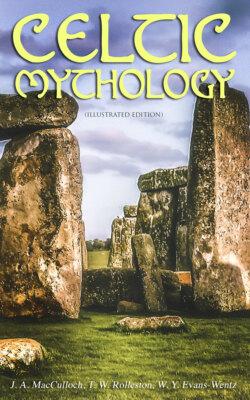Читать книгу CELTIC MYTHOLOGY (Illustrated Edition) - T. W. Rolleston - Страница 18
На сайте Литреса книга снята с продажи.
Diodorus
ОглавлениеDiodorus Siculus, a contemporary of Julius Cæsar and Augustus, who had travelled in Gaul, confirms in the main the accounts of Cæsar and Strabo, but adds some interesting details. He notes in particular the Gallic love of gold. Even cuirasses were made of it. This is also a very notable trait in Celtic Ireland, where an astonishing number of prehistoric gold relics have been found, while many more, now lost, are known to have existed. The temples and sacred places, say Posidonius and Diodorus, were full of unguarded offerings of gold, which no one ever touched. He mentions the great reverence paid to the bards, and, like Cato, notices something peculiar about the kind of speech which the educated Gauls cultivated: “they are not a talkative people, and are fond of expressing themselves in enigmas, so that the hearer has to divine the most part of what they would say.” This exactly answers to the literary language of ancient Ireland, which is curt and allusive to a degree. The Druid was regarded as the prescribed intermediary between God and man—no one could perform a religious act without his assistance.
